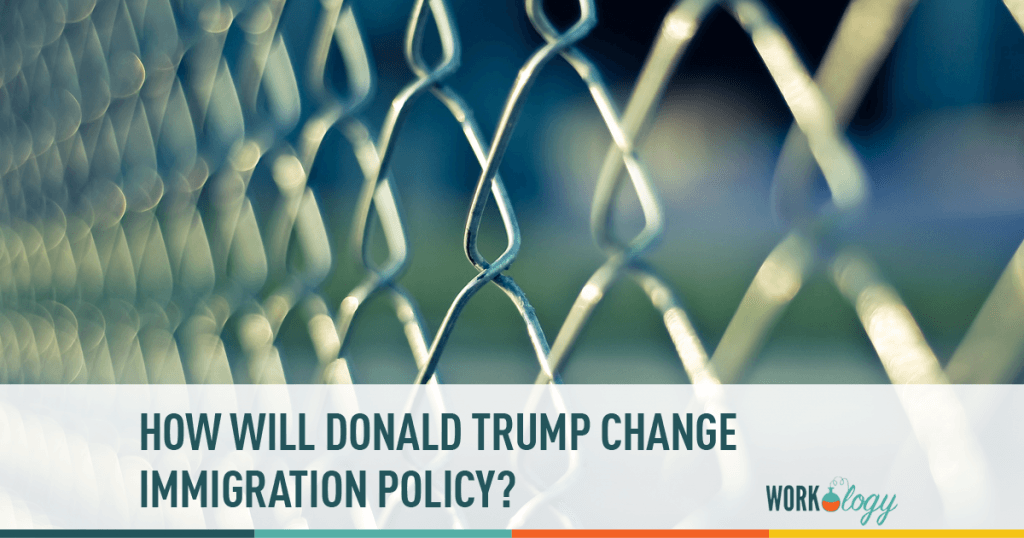Donald Trump’s victory in last week’s Presidential election is signal that there will be some upcoming to the U.S. immigration system that could greatly impact U.S. businesses, Human Resources professionals, and the economy as a whole. While no concrete policies have been set, yet, his campaign record on immigration should give employers pause for concern. The question is: how realistic is Trump’s agenda?
Undocumented Immigrants
The deportation of an estimated 11 million undocumented immigrants from the United States is almost impossible. In fact, earlier this week Trump dialed back his campaign rhetoric to express his intention to prioritize the removal of around 2-3 million undocumented immigrants with criminal records, which is a position that is actually in line with the current administration’s priorities.
Deporting all undocumented immigrants from the U.S. will require incredible amounts of new resources and funding, not mention cripple significant employment sectors of our economy which depend on the labor of undocumented immigrants. While many congressional Republicans might support Trump’s policies, would they support the cost? Politico estimates it would cost $166 billion to deport all of the undocumented immigrants in our country and complete a border wall. (No, by the way, Trump can’t force a country to spend money on something it does not want). The Bipartisan Policy Center estimates that Trump’s immigration attrition policies could increase projected deficits by about $800 billion over the next 20 years. By keeping immigrants in this country working, creating businesses, and making the goods and services that people want to buy we are ultimately increasing wages and employment opportunities. Would Republicans really be so foolish as to actually spend money on large-scale nationwide attrition programs and shut down entire employment sectors which depend on immigrant labor?
DACA
Trump has pledged to end President Obama’s deferred deportation program (Deferred Action for Childhood Arrivals (DACA)), which has provided “temporary relief from deportation” and work authorization to over 650,000 undocumented immigrants who arrived in the U.S. when they were minors. While it is certainly possible for the next President to overturn this executive action, it remains unclear whether he would simply prevent future renewals of the U.S. employment authorization documents for DACA individuals, or whether he would cancel and revoke existing employment authorization documents for DACA recipients. A more substantial concern, is whether DACA recipients would be more vulnerable to deportations based on the personal information they previously provided to the government as part of their application process.
Assuming, as Trump hinted earlier this week, that DACA recipients may not fall under his 2-3 million criminal aliens enforcement strategy, what economic benefit would arise from revoking the work permits of over 650,000 young immigrants who have been residents of the U.S. for decades, who are working and participating in the economy and attending college? What might be the harm to U.S. employers lawfully employing workers with employment authorization based on DACA? There may be severe consequences to our economy by eliminating valuable employees from our workforce, not to mention creating a humanitarian crisis by deporting these individuals.
H-1B Visas
During Trump’s campaign he expressed a desire to make it harder for American companies to obtain employment-based visas for immigrant workers. In particular, Trump called for policies to increase the regulatory costs for American businesses hiring skilled foreign workers in specialty occupations, particularly in the H-1B visa category.
While it is reasonable to expect that the new administration may add new statutory restrictions, institute stricter U.S. recruitment requirements, or increase USCIS filing fees, it is also possible that they may not make any changes to the existing employment-based visa program. As U.S. businesses are increasingly in need of high-skilled labor (especially in STEM fields), what benefit would the U.S. achieve by limiting the amount of intelligent, professional-level foreign nationals into this country?
TN Visas
Canceling the North America Free Trade Agreement (NAFTA) treaty with Mexico and Canada was a major talking point in Trump’s campaign. Doing so would most likely eliminate the TN visa for Canadian and Mexican nationals. Again, the elimination of a visa, like the TN, for high-skilled immigrants in the U.S. does not seem to be in the best interest of American businesses. Furthermore, scrapping NAFTA would also eliminate reciprocal visa options Canada and Mexico provide to U.S. workers seeking to engage in professional activities in those countries.
F-1 STEM OPT
Recent changes to the Optional Practical Training (OPT) program for foreign students on F-1 student visas and who graduated with degrees in science, technology, engineering, and mathematics (STEM), allow for an additional two years of U.S. work authorization. This new rule could be a target under the new President. Again, though, with U.S. employers in desperate need for STEM employees, cancelling the STEM OPT extension rule, would severely injure American companies.
“Extreme Vetting”
Trump’s most controversial policy called for some type of “extreme vetting” of foreign nationals from certain countries or certain religions. While it is not clear what he means by this type of vetting, the possibility of increased screening could have serious consequences for U.S. employers and employment-based visa holders, due to stricter scrutiny on visa petitions and longer visa application times. It might also make it harder for individuals to obtain U.S. citizenship.
In the end, it is realistic to expect some changes to the U.S. immigration system. Whether all the broad promises of Trump’s campaign will become reality is a different story. In less than 60 days, though, Donald Trump will take the oath of office as the 45th president of the United States. Therefore, employers and individuals considering whether to seek certain immigration-related benefits, should act sooner than later. In the meantime, please visit our website and sign up for our newsletter for the latest news regarding any changes to U.S. immigration laws.










Comments are closed.